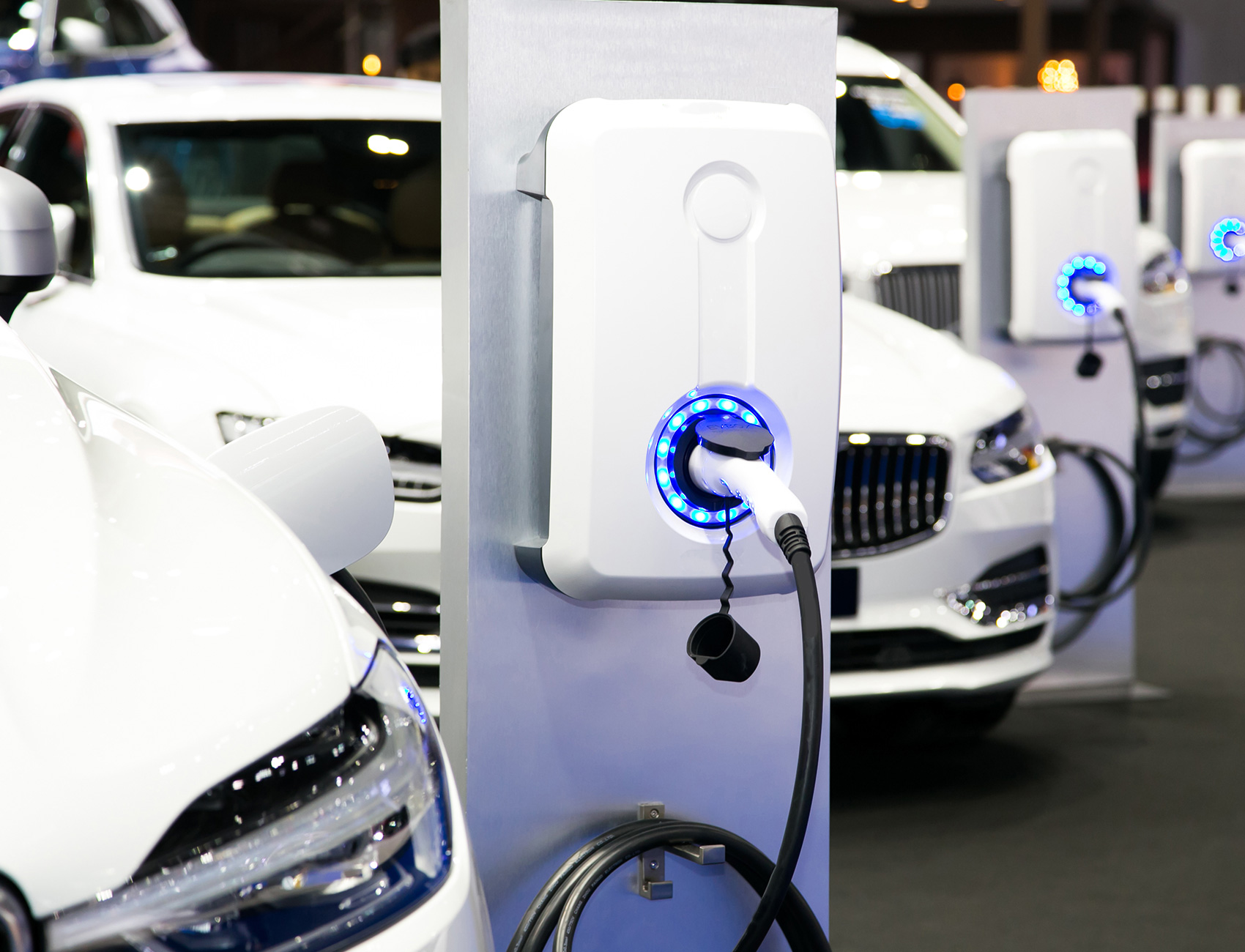Electric Cars vs. Gas Cars
Are Electric Cars Better Than Gas Cars?
As governments continue to push the shift from fossil fuels to renewables, automotive manufacturers are also moving towards electric car production and development. Though a regular car owner may find their upfront cost daunting, electric vehicles have advantages that outweigh their steep price tag. They excel in multiple factors important to any car owner, including maintenance cost, convenience, mileage, safety, and sustainability.
There are different types of electric cars, based on how they’re powered:
Check out our selection of parts for your EV or hybrid car.
Types of Electric Cars
Battery Electric Vehicles
(BEVs)
BEVs use a high-voltage battery and one or more electric motors. There is no internal combustion engine on board. Examples of BEVs include:
- Tesla Model S
- Tesla Model X
- BMW i3
Plug-In Hybrid Electric Vehicles
(PHEVs)
PHEVs have an internal combustion engine, a high-voltage battery, and one or more electric motors. The high-voltage battery can be recharged either by an onboard internal combustion engine or by plugging the car into an electrical outlet. In some cases, the electric motor recharges the battery during regenerative braking. Examples of PHEVs include:
- Chevy Volt
- Chrysler Pacifica Plug-In Hybrid
- Toyota Prius Plug-In
Hybrid Electric Vehicles
(HEVs)
HEVs have an internal combustion engine, a high-voltage battery, and one or more electric motors. The high-voltage battery is recharged by the internal combustion engine. In some cases, the electric motor may also recharge the battery during regenerative braking. Some examples are:
- Honda Civic Hybrid
- Chevrolet Malibu Hybrid
- Toyota Camry Hybrid
Maintenance Cost
Battery electric vehicles, also known as electric vehicles (EVs), tend to require less frequent repairs because they have fewer moving parts than gas cars. Fully battery reliant vehicles also don’t need oil changes and other regular maintenance activities linked to gas-powered engines. However, the cost of EV upkeep may depend on your location as well as on its year, make, and model.
Electric Cars
-
Fewer moving parts and repairs
-
Very little maintenance
-
Low number of qualified technicians and mechanics who can do repairs

Gas Cars
-
Has more moving parts, which may be prone to damage
-
May need more frequent engine maintenance
-
High number of qualified technicians and mechanics who can do repairs

Are Electric Cars Cheaper Than Gas Cars?
An EV's upfront cost may be up to 40% higher than an equivalent gas vehicle model, but it makes up for the difference with hefty ownership savings. According to Consumer Reports, electric car owners can save over $4,700 worth of fuel within the first seven years of ownership. Total ownership savings can range from $6,000 to $10,000 throughout the EV’s lifespan, depending on the make and model of the vehicles being compared.
How Much Does It Cost to Charge an Electric Car?
Whether you intend to charge your EV at home or at a public charging station, total cost may depend on the following:
-
Location
Average electricity price per state (at cents per kWh) is one of the biggest factors that contributes to charging cost. The national average electricity price recorded in January 2021 for residential consumers is 12.69 cents/kWh and 10.31 cents/kWh for the commercial sector.
-
EV model and onboard charger
Public charging station fees are paid by the hour, so longer charging durations may be more expensive. Most EV models come with a standard 6.6 or 7.7 kW charger, but older models with 3.3 kW chargers may take twice as long to recharge.
If you're charging at home, some utility companies offer at-home electric car charging plans, providing a separate charging meter at lower rates. However, you may need to shoulder installation charges to set up your at-home charging station.
Convenience
Electric vehicles are a little more convenient to own. Since they don’t have an engine, you don’t have to put up with scheduling spark plug replacements, timing belt checks, and other scheduled services essential for your engine. You can also charge an EV to full capacity while it’s parked at home overnight to get it running the next day. If your EV needs some extra juice, you can easily drop by a charging station near you to recharge. Of course, the availability of said charging stations is another discussion altogether.
Read more about the similarities between EVs and regular cars.Are There Enough Charging Stations for Electric Cars?
Since electric vehicles are becoming more common, access to charging stations is also being improved. The National Association of Convenience Stores has worked to make charging stations available and accessible to EV owners. Their Electric Vehicle Infrastructure Program has supported the installation of electric vehicle service equipment at convenience stores. Over time, a charging station may become just as easy to find as a gas station, but that may take a few more years.

Scroll to see the whole map
Swipe vertically to see the whole map
Mileage
It’s important to note how far your EV can go on a single charge. It may seem like a gas car performs better in terms of mileage. However, that isn’t always the case. Older EVs may underperform, but recent models have mileage comparable to any gas car.
Do Electric Cars Have Better Mileage?
As EV technology gets better, so does its standard performance and mileage. A conventional gas car can travel an average of 300 miles with a full tank of gas. However, some recent EVs can also go up to 300 miles or more with a full battery. This can vary depending on make and model, but EV performance continues to improve as new models are developed and released.
Do Electric Cars Last Longer Than Gas Cars?
The average lifespan of a regular gas engine is 150,000 miles, but well-designed vehicles can go up to 200,000 miles if properly maintained. However, an EV battery's average lifespan ranges from 100,000 to 200,000 miles depending on vehicle make and model. Manufacturers continue to improve EV battery life, but like any gas car, its longevity may be greatly affected by how well you take care of it. Of course, there haven’t been too many EVs that have reached that mileage for now, so we’ll have to wait and see how well they do over time.
Safety Features
All vehicles are made to meet an industry standard to maintain road safety. However, developments in the automotive industry have paved the way for electric vehicles with better safety features. Multiple EVs have received high safety ratings for good reason.
Are Electric Cars Safer Than Gas Cars?
The National Highway Traffic Safety Administration (NHTSA) has stated that electric cars’ batteries are less flammable than gas-powered engines, which makes them safer in crashes or collisions. Like most modern cars, EVs are also built with an extensive list of safety features.

Less flammable since they don’t carry gasoline
Produce no toxic gases
Most EVs have high-tech advanced driver assistance systems (ADAS), such as automatic emergency braking and adaptive cruise control.

Have fuel tanks that meet safety regulations, reducing chances of fire during collisions.
Late-model vehicles produce the cleanest emissions ever, but these may still be toxic when breathed in.
Most late-model vehicles have high-tech advanced driver assistance systems (ADAS), such as automatic emergency braking and adaptive cruise control.
Sustainability
There have been major advancements in reducing internal combustion engines' emissions over the years. However, electric cars are still more environmentally friendly than gas cars. They don’t emit any toxic gases and have cheaper ownership costs, making them a more sustainable option for car owners. Leaders across the globe are promoting electric cars in an effort to combat climate change and reduce environmental damage.
Why Are Electric Cars the Future?
Electric cars are considered future-proof modes of transportations because they aren’t powered by fossil fuels. Aside from reducing emissions, choosing EVs helps your country to become less reliant on non-renewable energy. On the other hand, electricity can be supplied from many sources, such as solar and wind power systems. Alternative renewable energy sources open up a new path for sustainable transportation that doesn’t harm the environment.
If the future of transportation is EV, how will the automotive repair industry cope? Read more here.
Additional Benefits of Getting an Electric Car
There are other benefits that have been set up to help motivate car buyers to choose an EV as their next daily driver:

Electric Car Incentives and Tax Credit
EV buyers receive numerous incentives from utility companies. Providers, including Georgia Power, Pepco, the Orlando Utilities Commission, and the Los Angeles Department of Water & Power have made these available to help motivate drivers to buy electric cars. They offer rate discounts, rebates and other incentive plans. New buyers can also receive federal tax credits, depending on their EV year, make, and model. You can get up to $7,500 worth of tax credit for a single EV purchase.

Electric Cars are Quieter
EVs are quieter because they don’t make combustion sounds. They’re pretty much silent from inside and outside the cabin. However, manufacturers are being asked to change that for the sake of road safety. Regulations have been made to make EVs produce artificial sounds when moving at low speeds to alert pedestrians of their approach. The sound could be as soft as a refrigerator’s humming, so it’ll still be quieter than any gas car.

Electric Cars Have Parking and Carpool Lane Privileges
Some states allow reserved parking in municipal locations and airports as well as free or reduced parking for EVs. They can also have toll reductions and access to high occupancy vehicle (HOV) lanes, even if you’re the only occupant. Some of these privileges may be subject to eligibility depending on your state HOV lane regulations and what kind of EV you’re using.
There are clearly more advantages in buying electric vehicles vs. gas cars. EVs will become more common in the future, as national and industry leaders work together to help conserve the environment and promote sustainable transportation. It may be best to get on the EV bandwagon sooner than later.
About CarParts.com
For over 20 years, CarParts.com has been a leader in the e-commerce automotive aftermarket, providing collision, engine, and performance parts and accessories. With over 50 million parts delivered, we've helped everyday drivers across the contiguous United States find the right parts to keep their vehicles on the road.
With a focus on the end-to-end customer experience, we've designed our website and sourcing network to simplify the way drivers get the parts they need. Our vehicle selector and easy-to-navigate, mobile-friendly website offer customers guaranteed fitment and a convenient online shopping experience. And with our own wide distribution network, we bring the very best brands and manufacturers directly to consumer hands, cutting out all the brick-and-mortar supply chain costs to provide quality parts at a discount for our loyal customers. Combined with our 60-day return policy and satisfaction guarantee, CarParts.com makes it simple for customers to get parts delivered straight to their door. CarParts.com is headquartered in Torrance, California.

